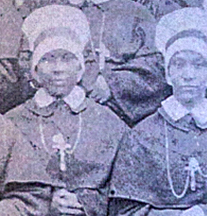 Recently, Georgetown University in Washington, D.C., held a ceremony to name a campus building to honor Anne Marie Becraft, who in 1820 founded a school for Black girls in Washington. At the time she founded the school, Becraft was 15 years old.
Recently, Georgetown University in Washington, D.C., held a ceremony to name a campus building to honor Anne Marie Becraft, who in 1820 founded a school for Black girls in Washington. At the time she founded the school, Becraft was 15 years old.
Eleven years later, Becraft moved to Baltimore to join the Oblate Sisters of Providence, the first African American religious order in the United States. She took the name Sister Mary Aloysius and taught at the Saint Frances School for Colored Girls in Baltimore. She died in 1833 at the age of 28 from a “chest malady.”
 Marcia Chatelain, associate professor of history and African American studies at Georgetown University, notes that Becraft is highly deserving of the honor bestowed by the university. “She was a devout Catholic and deeply committed to educating young girls of color in the nation’s capital,” Dr. Chatelain said. “Though she experienced both anti-Catholic and anti-black intimidation, she nevertheless responded to her calling to teach and to serve God.”
Marcia Chatelain, associate professor of history and African American studies at Georgetown University, notes that Becraft is highly deserving of the honor bestowed by the university. “She was a devout Catholic and deeply committed to educating young girls of color in the nation’s capital,” Dr. Chatelain said. “Though she experienced both anti-Catholic and anti-black intimidation, she nevertheless responded to her calling to teach and to serve God.”
Anne Marie Becraft Hall has been known as Remembrance Hall for the past two years. Previously, the building was named for Rev. William McSherry, a former president of the university, who was involved in the 1838 sale of 272 slaves who were owned by the Maryland Province of the Society of Jesus. The deal, with a slave owner in Louisiana, was made in order to reduce the university’s debt.









